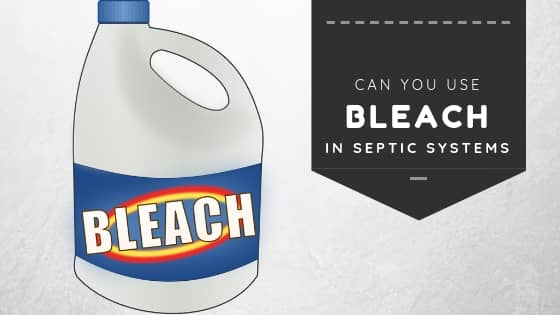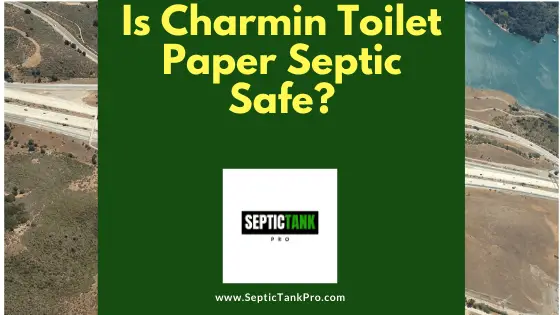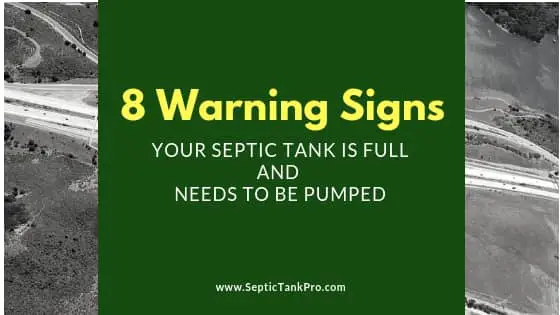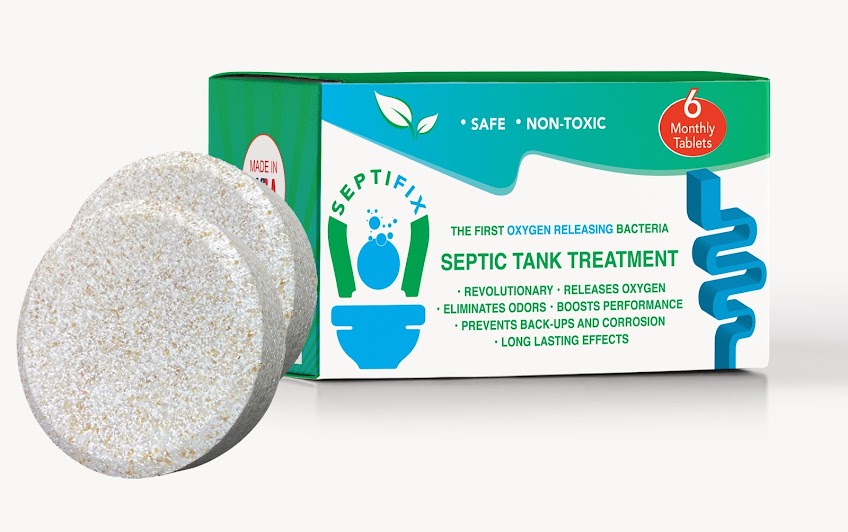Can You Use Bleach In A Septic System
Bleach is one of the most commonly used cleaning substances in most homes and you probably hadn’t ever thought about whether or not you should actually be using it until you had a home with a septic system. In this article, we will take a look at using bleach in a septic system, discussing the potential harm and dispelling the misconceptions you might have heard.
So, Can Bleach be used in a Septic System? The short answer is Yes, Bleach can be used in a septic amount in moderate amounts, however, overusing bleach in your septic system can cause harm to the bacteria in the tank.
Continue reading to find out why too much bleach can be harmful to your septic tank system, and what amount is actually safe to use in your system, as well as ways to manage your bleach usage.
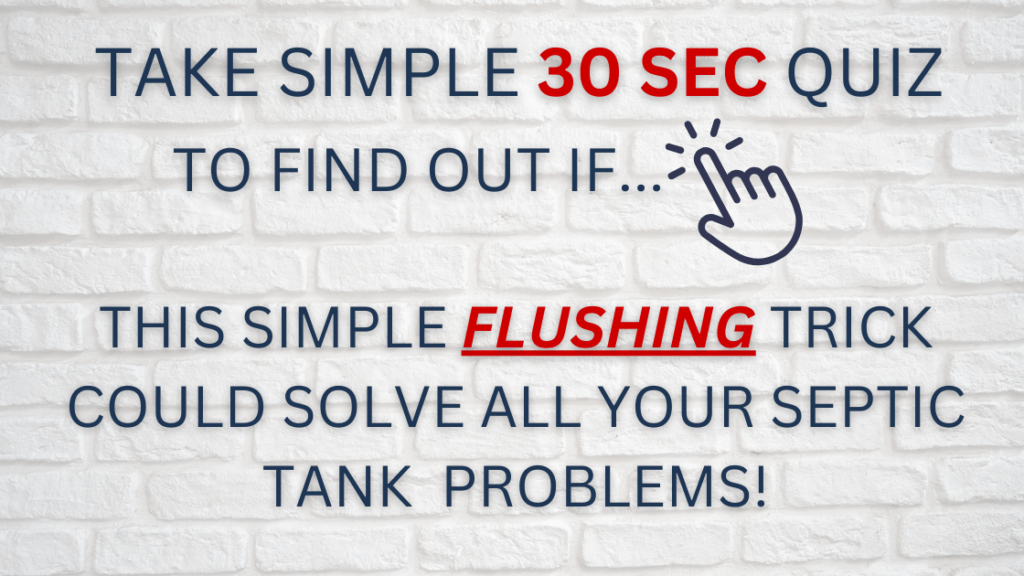
How Much Bleach is Safe for a Septic System?
Above we mentioned that using bleach in a septic system in moderation is actually ok. But, you are probably wondering well what does moderation exactly mean. So let’s take a closer look at exactly how much bleach is safe for your septic system and what is too much bleach for your septic.
When looking at using bleach in your septic tank, a moderate amount is described as about 3/4 of a cup per wash of laundry on the Clorox site itself. At that amount, most of the hydrochloride will be used up in the watch as it reacts to the dirt and germs in the wash turning into salt and water. The remaining bleach in the water will react to the items in the pipes on the way to the septic tank, turning to mostly salt and water before entering the septic tank.
Now you should note that you should be careful not to do a lot of bleach white loads back to back, as it could have an additive affect on your septic system. So a few space out loads per week should be fine.
Make sure you are also accounting for other items that may be adding bleach to your septic system and not just the amount that is in your washer. But in general, if you don’t overuse the amount of bleach in your wash, and space out the white loads, you can go ahead and use bleach in your septic without any harmful effects.
What Could Happen If You Use Too Much Bleach In Your Septic System?
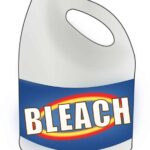
As we said above, bleach used in moderate amounts can be used without having a negative effect on your septic system. But let’s say you were for some reason to pour too much bleach into your septic system, what could happen?
Remember your septic system works by having living bacteria break down the solid waste in your septic tank and moving the effluent (wastewater) into your drainage area. If you were to dump say 2 bottles of bleach into the septic system, depending on the size of the system, it could potentially not get diluted enough before it entered the tank and when it mixes with the water in the tank, it still could be potent enough to kill the essential bacteria in your septic tank.
If the bacteria in your septic tank were to die, your system wouldn’t be able to properly process the solid waste material, meaning material could flow into the drainage area, clogging the system and eventually causing it to back up.
Other Household Items Septic Owners Should Be Aware of that Could Contain Bleach
So as we said, when it comes to bleach in your septic tank, moderation is the name of the game. So we wanted to keep you on the lookout for other household items that could contain bleach, and you should keep in mind if you have a septic system.
We wanted to make it easy for you to look for and spot the ingredient in bleach so you can be aware of it in your other common household supplies.
Here is the chemical information for Bleach. So be in the lookout for items containing sodium hypochlorite, or any of its synonyms like hypochlorite, hypochlorite sodium, and Sodium oxychloride.
| Chemical Information | ||||||||||||
|---|---|---|---|---|---|---|---|---|---|---|---|---|
| Chemical Name: | Sodium hypochlorite | CAS Registry Number: | 007681-52-9 | Synonyms: | Antiformin; Carrel-dakin solution; Chloros; Deosan; Hyclorite; Hypochlorite sodium; Sodium oxychloride | ||||||
| Chemical Name: | Sodium hypochlorite | |||||||||||
| CAS Registry Number: | 007681-52-9 | |||||||||||
| Synonyms: | Antiformin; Carrel-dakin solution; Chloros; Deosan; Hyclorite; Hypochlorite sodium; Sodium oxychloride |
Remember you also, want to look at the concentration of these chemicals in the product you are buying, the higher the concentration the less you should use in your septic system.
Common Items With Sodium Hypochlorite
- Laundry Detergent – Bleach
- Toilet Cleaners (including those little discs that clip onto your toilet, they release chlorine in every flush)
- Disinfectants & Sanitizers
- Drain Cleaners
Again, using these in moderation is no big deal, but don’t purchase every household cleaner with bleach in it and pour it down your sink at the same time. That could lead to issues for your septic system.
Related Questions to Products Containing Bleach
Does Lysol Contain Bleach?
Not all Lysol products contain bleach. Please check the package if you are trying to find a Lysol based product that doesn’t contain bleach. Here is a quick example:
- Lysol Product With Bleach: Lysol All Purpose Cleaner, White and Shine, With Bleach
What Should I do If I want to Stop Using Bleach in My Septic?
If you want to stop using bleach in your septic system altogether, you can look for bleach alternatives. Look for organic household cleaners as an alternative to the bleach-based products you were using.
Here are some alternatives to Bleach
- Hydrogen Peroxide: Non-toxic disinfectant
- Vinegar: Natural Sanitizer
- Tee Tree Oil: Natural antiseptic, but remember it kills bacteria as well
- Lemon Juice
- Baking Soda
The Long Story short is that while Bleach is something to be aware of when you live in a home with a septic system, the main thing to remember is that you don’t want to use too much of any item that might kill the bacteria in the septic system which are crucial to breaking down the waste.
- So make sure you are using these items in moderation, accounting for the additive effect that can happen with accumulation. You should consider the concentration of the substance, how much it will be diluted while going through the system and how the remaining substance will affect the water in the septic tank.
Problems with Your Septic Tank?
- You can consider adding an additive to your tank if you think the bacteria has become unbalanced in the system. Though the effects of these additives are debated and generally considered ineffective by the department of health. Learn more about these inexpensive simple septic tank additives like RidX here.
- If you think you have a bigger problem, consider calling a professional to inspect your septic system. You can find a local septic system professional near you in our local directory.
I hope this video helped answer the questions you had about using bleach in your septic system moving forward. Just remember the fact that you are taking the time to learn how to maintain your system, will go along way in helping to extend its life.
If you have additional septic system questions, visit our Septic Wiki to find the answers to more common septic tank questions.
If you need to get your septic system serviced find a local professional in our state by state directory. Simply click your state below.
[us_map]

